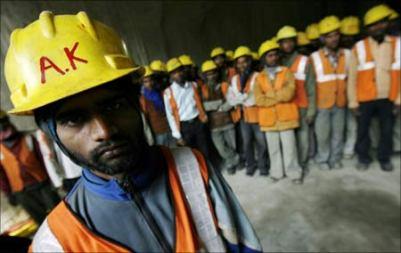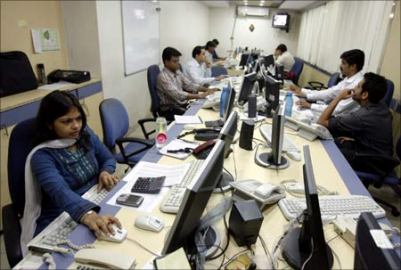BS Reporter in New Delhi
India would weather the current economic crisis better than most countries, the International Labour Organisation (ILO) has said in its annual Global Employment Trends report for 2012, titled 'Preventing a deepening jobs crisis'.
The world faces the challenge of creating 600 million jobs over the next decade, says the report. After three years of crisis in global labour markets and prospects of a further deterioration of economic activity, there is a job backlog of 200 million, the report says.
And, 400 million new jobs will be needed over the next decade to absorb the estimated yearly growth of 40 million in the labour force.
India's problem is productive jobs: ILO
Sher Verick, senior employment specialist at the ILO office here, says 40 million jobs are needed each year for those joining the labour force. This is a demographically driven need. But the backlogs each year and job losses may mean an additional 20 million jobs being needed yearly.
That economies are not generating enough jobs is reflected in the employment to population ratio, which suffered the largest decline on record between 2007 (61.2 per cent) and 2010 (60.2 per cent).
For the fourth consecutive year, global unemployment remained elevated in 2011, at somewhere near 197 million it says. The report says the number of jobless has risen by 29 million since 2007.
...
India's problem is productive jobs: ILO
Of the 60 million new jobs the ILO says are needed annually across the world, at least a fifth of this need is in South Asia. The latter region, led by India, has been an exception to the depressed economic conditions.
The report attributes it to robust economic growth, thanks mainly to a rise in labour productivity in the five years ending 2009-10, rather than an expansion in employment. It says till the 2000s, labour productivity and employment grew at similar rates. But over the past decade, increased productivity has taken over as a driver of growth in the region.
In India, total employment grew by only 0.1 per cent yearly over the five years till 2009-10, says the report, "from 457.9 million in 2004-05 to 458.4 mn in 2009-10, while labour productivity grew 34 per cent over this period".
...
India's problem is productive jobs: ILO
It said the main labour market challenges in South Asia were two-fold, viz "increasing labour productivity to ensure that incomes are rising and poverty is falling, and creating enough jobs for a growing working age population which is expanding by two per cent each year".
It says "India would weather the current economic crisis better than other countries", adding that it was "struggling with stubborn levels of inflation, despite monetary tightening".
According to Verick, the negative impacts would reflect mainly on the persistence of informality in employment and on the number of people living in working poverty.
...
India's problem is productive jobs: ILO
In India, as elsewhere in South Asia, working poverty and an increase in number of those living below the $2 a day poverty line are the more likely impacts than in the creation of joblessness.
It may slow down productivity and, hence, wage growth, he added.
The report says, "Overall, the worsening economic conditions will make it more challenging for the region to promote the creation of productive jobs in the non-farm sector and continue the battle against the persistence of informality (in jobs), vulnerable employment and specific barriers for women and youth in the labour market."







article